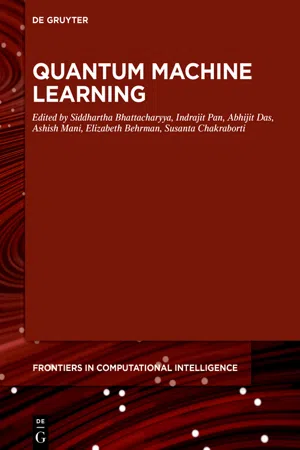Sandip Dey Department of Computer Science, Sukanta Mahavidyalaya, Jalpaiguri, West Bengal, India
Sourav De Department of Computer Science & Engineering, Cooch Behar Government Engineering College, Cooch Behar, West Bengal, India
Siddhartha Bhattacharyya CHRIST (Deemed to be University), Department of Computer Science and Engineering, CHRIST (Deemed to be University), Bangalore, India, Hosur Road, 560029, Kolkata, Bangalore, Karnataka, India
Abstract
Quantum Machine Learning (QML) is popularly known to be an integrative approach to learning of the Quantum Physics (QP) and Machine Learning (ML). In this chapter, an outline of the fundamental ideas and features related to quantum machine learning is laid out. The different facets of quantum algorithms are discussed in this chapter. In addition to this, the basic features of quantum reinforcement learning and quantum annealing are also provided in this chapter. Finally, the chapter deliberates about the advancement of quantum neural networks to through light in the direction of QML.
1.1 Quantum machine learning
Machine learning has become an emerging discipline in the recent technologies. It can be used in a variety of fields, such as computational biology, computer vision, computer security and many others. Data analysis (DA) is an equally important part in the modern industry. The ML and DA analyze data by applying statistical methods and they provide computers learning capabilities on the basis of the analysis of observed data. On the basis of learning style, Machine learning algorithms (MAA) are basically classified into different groups, viz., supervised learning (SL), unsupervised learning (UL) and semi-supervised learning (SSL). The foremost shortcomings of using ML techniques are generally known to be computational time and storage, especially which involve bulky amounts of data. In addition to these, when the current deep learning algorithms are used, the training time can turn out to be even longer. In the subsequent generation, researchers got a viable alternative by utilizing the power of quantum computers method which can be smarter enough to reduce the storage and computational time as mentioned above.
Many ML problems use linear algebra to figure out matrix operations by expressing the data in matrices. Quantum computing (QC) is able to make several linear algebra computations more fast, which unreservedly improve classical ML tasks [1, 2]. Numerical methods for optimization are well admired field of research, which intend to improve the computations of the said optimization procedures. Like classical optimization, quantum optimization, a branch of QC, attempts to improve the said techniques even further. Two renowned methods of this kind are Quantum Gradient Descent (QGD) [3] and Quantum Approximate Optimization Algorithm (QAOA) [4]. These methods are efficiently applied in quantum neural networks (QNN) like Quantum Boltzman Machines [5].
Of late, the quantum machine learning, a very new field of emerging inter-disciplinary research area, has come out, with the objective of coalescing the theory of machine learning with the properties of quantum computing. Quantum machine learning (QML) is intended for implementing machine learning algorithms (MLLs) in quantum atmosphere (systems) [6], by applying quantum features such as quantum superposition and quantum entanglement for solving different problems with high efficacy. Basically, QML is known to be a sub-discipline of quantum research of information processing, with the objective of introducing quantum algorithms that generally learn from data with the aim of improving existing approaches in ML. Hence, the purpose is to develop quantum applications of various MLLs, having the influence of quantum computers as well as the flexibility and learning ability of MLLs.
Several quantum algorithms have been introduced for a variety of machine learning models which include neural networks (NN), graphical models, support vector machines (SVM) so on and so forth. QML explores more basic questions about the thought of learning from the quantum perspective. In some occasions, the QML is extensively defined by researchers to apply ML to quantum information.
Besides the implicit methodologies used in QML, there exists few quantum versions of classical ML algorithms. Quantum Support Vector Machines (QSVM) [1], which is basically applied for linear classification, is a popular example of this type. In addition to that, Quantum Principle Component Analysis (QPCA) [7], a popular approach for dimensionality reduction, Quantum Guassian Mixture Models [8], another renowned approach for estimating clustering and density. An emerging sub-discipline of ML is called Deep Learning (DL). These days, quantum computers are employed for DL applications, which involve significant storage and time. Some popular examples of these applications are Quantum Boltzmann Machines [5], Quantum Generative Adversarial Networks [9], Quantum Convolutional Neural Networks [10] and Quantum Variational Autoencoders [11]. Additionally, a more enlightened field inside ML is known as Reinforcement Learning (RL). RL can be described as learning as time continues by exploring the environment.
1.2 Grover search algorithm
Grover’s Search Algorithm (GAA) is a very popular quantum search algorithm [12]. This algorithm finds a group of elements which satisfy a certain condition. For performing this task, a black box, usually known as an oracle, having the capability of identifying the elements, must satisfy the criteria that are required to find. Let us suppose that the group has N elements, the oracle is called O(M) times for classical computations to get all element...




